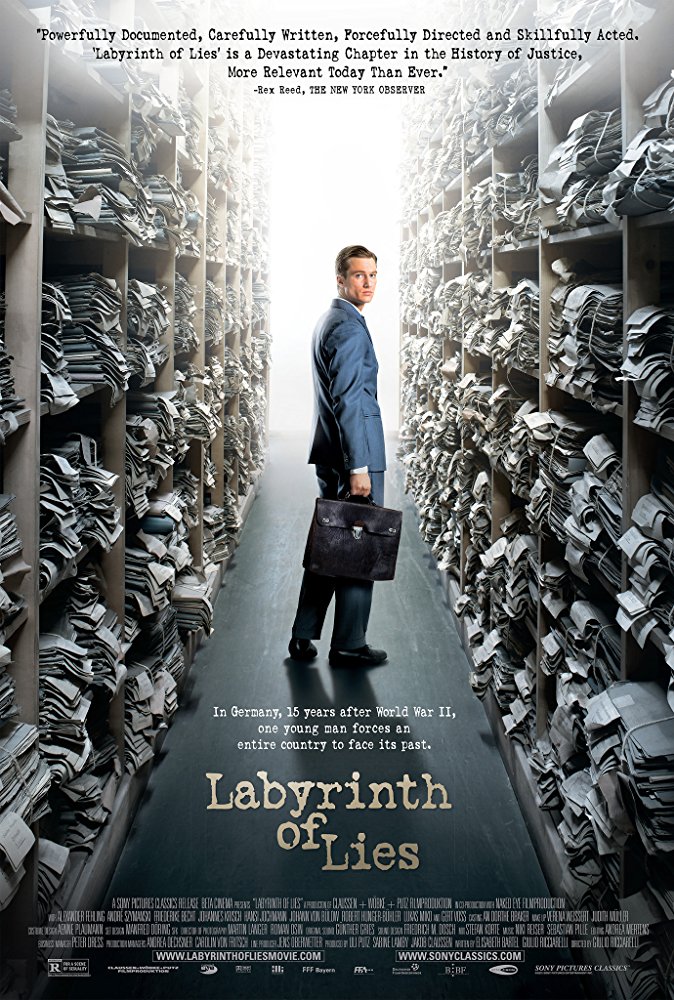
LABYRINTH OF LIES 2014 TRIAL
The film ends with the opening of the trial of several hundred former Auschwitz workers.

After going to Auschwitz to say kaddish, the Jewish mourning prayer, for a friend's two daughters who were killed there, he goes back to work for the West German state prosecutor. Growing out of the simplistic right/wrong moralizing, he comes to understand life as more complex, and seeks to repair all the damage, large and small, he inflicted in his zeal. He comes to understand that the only thing that can ease the horror is not justice, but attention to the lives and stories of those who suffered. His idealism has suffered from hard encounters with the real world at every turn, the "system" wants compliance, but he wants justice. There he is again confronted with the dilemma: do what is right or do what the system requires you to do? When he finds this means working with a colleague who had defended a former Nazi he was investigating, Radmann walks out. He resigns his official post and goes to work for an industrialist. By the end of the film, however, there is a chance she will have him back. Original title: Im Labyrinth des Schweigens (Labyrinth of Lies). When he tells Marlene that her father too was in the party, she ends their relationship. Labyrinth of Lies is a film directed by Giulio Ricciarelli with Alexander Fehling, André Szymanski, Friederike Becht, Johannes Krisch. Radmann reaches a crisis when he discovers his own father was in the Nazi party. Meanwhile, Radmann allows himself to be seduced by Marlene, a seamstress who, benefiting from Radmann's connections, starts a business as a dress designer. Having pulled off this coup, Israel declines to pursue Mengele. As a result, Adolf Eichmann is kidnapped and spirited away to Israel where he is tried, convicted and executed for his crimes. The department invites Mossad agents to visit, and shares its information with them. After the authorities block Radmann's attempt to issue an arrest warrant, his boss warns him off and orders him to concentrate on lower-profile suspects. He goes after Josef Mengele, who lives in Argentina, but flies back to West Germany to visit his family. occupation forces give him access to their files, and he discovers there were 8,000 workers.

Radmann's boss, the prosecutor-general Fritz Bauer, puts him in charge of investigating former workers at the Auschwitz camp. Radmann is determined to bring Schulz to justice, but finds his efforts frustrated because of the many former Nazis who are serving in government and looking out for one another.

A story that exposes the conspiracy of prominent German. The recreation of a post war Germany quietly trying to rebuild itself and march to a new kind of state drum roll are elegantly recreated by the director, Giulio Ricciarelli and the film ends up, despite all its disappointments and false starts faced by the young lawyer, of being quite a moving drama.The synopsis below may give away important plot points. With Alexander Fehling, Andr Szymanski, Friederike Becht, Johannes Krisch. Though there's very little violence in the film, just people reading Nazi-written descriptions of events that happened in the camps has a blood curdling effect. Before he knows it or wanted it he realizes he's taken an enormous bull by the horns. Fortunately we have the idealistic young lawyer, Johann Radmann (Alexander Fehling) working for the Frankfurt city government to tend to the matter once he becomes alerted to the fact that a ruthless Nazi commandant is currently teaching children at an elementary school but the young lawyer is soon inundated by the denial of the culprits who slipped right back into German middle class life without a faretheewell and the other Germans who just don't want to have to hear it and remember it. Of course, it wouldn't have been half so easy had not the Nazis themselves been such ferocious note takers of every inhuman act they performed and the Americans kept and filed away afterwards.

It's the early 60s and there are still people who when asked what "Aushwitz" was say, "Oh, it was a POW camp just like the British, French and Russians kept prisoners of war in." So, obviously even in West Germany the process of de-Nazification took a long time to penetrate a lot of thick skulls and denial. No one should be surprised that even Germany had to cocoon itself with a thick layer of barbed wire to keep from having to face what the country not only had just been through but many had actively and enthusiastically participated in.


 0 kommentar(er)
0 kommentar(er)
